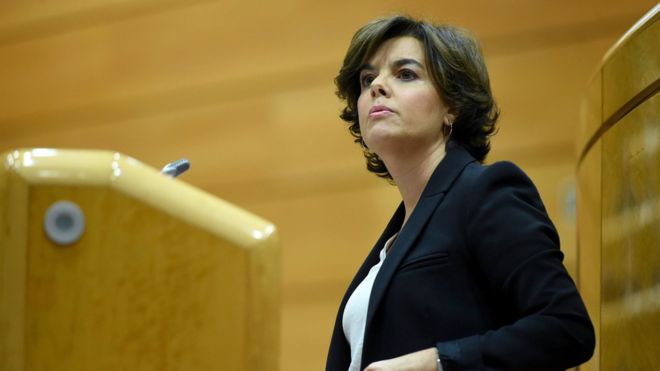The Spanish government has stripped Catalonia of its autonomy and taken charge of its government.
The measures early on Saturday came after the Catalan parliament voted to declare independence on Friday.
An official state bulletin dismissed Catalan leaders and handed control of Catalonia to Spain’s Deputy Prime Minister, Soraya Saenz de Santamaria.
Earlier, Spain’s interior ministry took charge of Catalonia’s police after firing senior Catalan police officials.
On Friday, PM Mariano Rajoy announced the dissolution of the regional parliament and the removal of the Catalan leader, and called snap local elections.
Demonstrations for and against independence went on into the night.
More are expected on Saturday, with a rally “for the unity of Spain and the constitution” to be held in Madrid.
Barca coach ducks Catalan questions
Catalonia crisis: What next for Spain?
What powers does Catalonia have?
The crisis began when Catalan leaders held an independence referendum, defying a ruling by the Constitutional Court which had declared it illegal.
The Catalan government said that of the 43% of potential voters who took part, 90% were in favour of independence. Others boycotted the vote after the court ruling.
On Friday afternoon, the Catalan regional parliament voted to declare independence from Spain.
Soon after, the Spanish Senate granted Mr Rajoy’s government the power to impose direct rule on Catalonia.
It did so early on Saturday by publishing an official bulletin (in Spanish) that dismissed Catalan leader Carles Puigdemont, his deputy Oriol Junqueras and all government members.
The announcement came hours after the Madrid government removed Josep Lluís Trapero Álvarez as chief of Catalonia’s autonomous Mossos police force.
Mr Trapero was already under investigation for sedition, accused of failing to help Spain’s Guardia Civil police tackle thousands of pro-independence protesters in Barcelona during the run-up to the referendum.
Pere Soler i Campins, the Mossos director general, has also been dismissed.
“[Mr Puigdemont] had the opportunity to return to legality and to call elections,” Mr Rajoy said.
“It is what the majority of the Catalonian people asked for – but he didn’t want to do it. So the government of Spain is taking the necessary measures to return to legality.”
Regional elections are scheduled for 21 December.
Mr Puigdemont urged supporters to “maintain the momentum” in a peaceful manner. Spanish prosecutors say they will file charges of “rebellion” against him next week.
Separatists say the independence move means they no longer fall under Spanish jurisdiction.
But the Spanish Constitutional Court is likely to declare it illegal, while the EU, the US, the UK, Germany and France all expressed support for Spanish unity.
Rajoy’s dangerous move
By Sarah Rainsford, BBC News, Madrid
Spain’s prime minister may have hoped warning Catalonia against declaring independence would be enough. Now he has to follow through on his pledge to impose direct rule, knowing this is highly risky.
Mariano Rajoy argues that Catalan separatists left him no choice. He had to act, to return the region to “legality”, as Madrid puts it. But actually doing that will be complex and highly fraught.
It’s why Mr Rajoy called for calm in Spain, after the Catalan vote for independence. He is acting with broad, cross-party support though, and public backing.
Here in Madrid many people have begun flying the Spanish national flag from their windows and balconies, to show their support for keeping the country united.
There is some sympathy for the Catalan cause, mostly because of the police crackdown during the referendum. But far louder are calls to prosecute those pushing for independence. It’s a move which many Spaniards, like their government, are convinced was illegal.
EU risks “more cracks” appearing
The case for and against independence
What’s the reaction been?
Thousands celebrated the declaration of independence on the streets of Barcelona, Catalonia’s regional capital.
The same crowds that cheered each Yes vote from Catalan MPs reportedly booed Mr Rajoy as he made his announcement.
There were pro-unity demonstrations too, with protesters in Barcelona waving Spanish flags and denouncing Catalan independence. A large pro-unity rally is expected in Madrid on Saturday.
In other reaction:
Barcelona’s mayor Ada Colau condemned the move by Madrid, but also criticised Catalan pro-independence parties for “advancing at a kamikaze pace…after their mistaken reading of the results of the Catalan elections”
EU President Donald Tusk said Madrid’s government “remains our only interlocutor” in Spain, but called for restraint
The UK government said it did not recognise the declaration of independence by Catalonia.
How did we get here?
After the 1 October referendum, Mr Puigdemont signed a declaration of independence but delayed implementation to allow talks with the Spanish government.
He ignored warnings by the Madrid government to cancel the move, prompting Mr Rajoy to first announce his plans to remove Catalan leaders and impose direct rule.
Does Catalonia want to leave Spain?
Reality Check: Police violence in Catalonia
Catalonia is one of Spain’s richest, most distinctive regions, with a high degree of autonomy.
Many Catalans feel they pay more to Madrid than they get back, and there are historical grievances, too, in particular Catalonia’s treatment under the dictatorship of General Franco. But Catalans have been divided on the question of independence.
BBC

